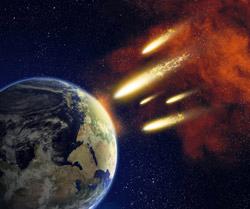Canadian_watcher wrote:"The probability of a secret space program raining rocks down on us to scare <country's leadership> into <rock-raining country's ambition>?"
That seems more likely, to me. Countries do still threaten each other, right? Unbeknownst to the rest of us, even? Or possibly it could be a secret space program that went haywire. Oh, and while I'm at this, what about the fact that I don't think anyone has seen any rock-like shit that just recently came from space, either. Did they? It mightn't have been rocks is all I'm saying.
Excellent thinking. Excellent advice to phrase things provisionally for greater accuracy.
With the bigger asteroid and the other falling meteorites, maybe there's some kind of space-agency/military target practice happening, taking the rare opportunity to train and test for the civilization-killing black swan of an asteroid that is virtually guaranteed to hit earth within the next 100 to 100 million years. It's one national security project all of us should absolutely want a government to be doing, trying to develop ways to divert or destroy asteroids. (Unless you're radically misanthropic and don't care, or even want an asteroid to "reboot" everything, in which case, let me know so I can set you as a "foe", and then go fuck yourself, lol.)







